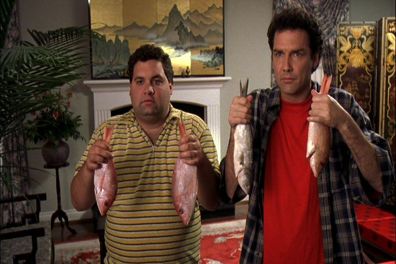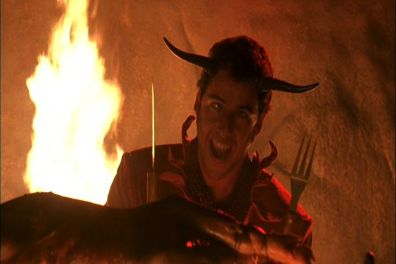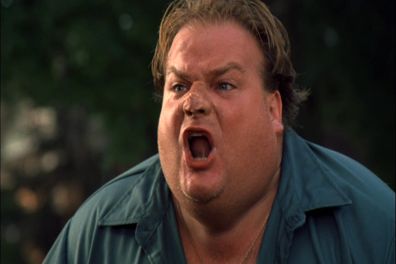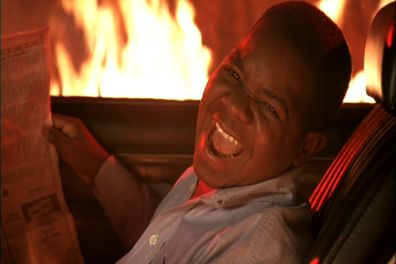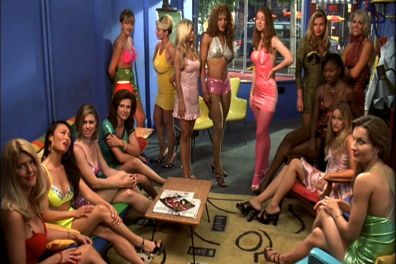Dirty Work (1998)
What hurts the most is the lack of respect!
This review requires an obligatory disclaimer to start it off. I did not know Norm Macdonald. I never met him, never exchanged so much as a single Tweet with him. After he died, I never used an Ouija board to channel his soul into my body, so I could make my website funnier. This whole time, Norm could’ve be a huge hypocrite, for all I know.
There are phrases I thought up to try categorizing Norm here. ‘Masterclass troll’ was one of them. ‘Comedy demon’ was another. Maybe just ‘demon’ will do. There was something supernatural about him for sure, and the magic of YouTube has helped me discover more about the guy.
There are the clips of him sitting on late night talk show couches, waiting for moments to strike during boring spiels. There was his infamous Moth Joke, where he led a live audience through a ten minute story, only to end it with the final boss of anticlimactic punchlines. During a podcast episode, he forced laughter out of a hapless victim over serial killer Albert Fish eating African-American children. Norm was a devil who yanked laughter out of your fucking mortal soul.
And Norm is most of the reason I can’t hate Dirty Work, directed by clean-cut TV dad Bob Saget. Dirty Work is what happens when you take Norm's Saturday Night Live Weekend Update anchor, give him a name (Mitch), background (slacker), and build a plot around him. The story is an excuse for Mitch to respond to every situation with deadpan, cynical one-liners. It’s as if Norm is back in the SNL newsroom saying “huge breasts!” or “insert-punchline-that-OJ-is-a-murderer,” but it’s a movie. He even brings in the “note to self” tape recorder gag. Dirty Work is check-your-brain-at-the-door-dumb, almost on Billy Madison’s level, except more coherent.
Mitch is kind of a sociopath. Not in an Albert Fish way, but in the only way that justifies this character’s personality. He and his best friend Sam spend their childhoods living by one rule, “don’t take crap from anyone.” Whether it’s planting guns in a bully’s desk, or applying superglue to Mitch’s ass to bust a pedophile crossing guard, revenge is a means for survival. Mitch and Sam turn it into an art form until they grow into Norm MacDonald and Artie Lange, (dis)respectfully.
The only father figure Mitch knows his entire life is Sam’s dad, Pops (Jack Warden) a boxer and dirty old man. It’s from Pops that Mitch gets his core philosophy. Now in his golden years, Pops spends retirement getting turned on by exercise videos, leading to a severe heart attack. Bedridden, Pops reveals that he is Mitch’s real father. Under threat of ball squeezings, Pops warns Mitch to keep this a secret from Sam, which sets up a sort-of secondary conflict.
Pops’s physician, Dr. Farthing (Chevy Chase) tells the boys Pops needs a heart transplant to survive, but his advanced age makes him an unlikely candidate. However, the doctor himself needs $50,000 to pay off his gambling debts. If Mitch and Sam can get him the $50k, he'll arrange to move Pops to the top of the transplant list.
The problem, of course, is Mitch and Sam are losers with no skill sets, so there’s no way they can get that $50k in the time Pops has left. But after paying back an abusive theater manager by switching Men in Black with Men in Black Who Like to Have Sex With Each Other, the two get an idea. No, it’s not having sex with each other. It is, however, turning their lifelong love of getting even into a revenge-for-hire business.
The business is a fish smelling, hookers-pretending-to-be-dead-in-trunks success. This captures the attention of Travis Cole (Chris Macdonald) an evil property owner whose business is gentrification in the guise of ‘saving the community.’ Travis manipulates our heroes into doing something extra heinous under the false promise of $50k. Mitch then grows something resembling a conscience, and uh, you know, whatever…
Oh, and Traylor Howard plays Kathy, Mitch’s obligate love interest in this movie. There’s not much to say about Kathy because the movie barely spends any time on her, or love interests. Probably on purpose. Since Norm MacDonald plays the lead, maybe that would’ve be too awkward. What, was Norm supposed to be Dane Cook? Pausing for tender moments is more Adam Sandler’s gig.
The overall plot doesn’t matter, either, as Dirty Work has a paper-thin premise. Probably on purpose. It’s like asking if that tape you found deep in the woods enriched the human condition with its meaningful themes. Dirty Work spends 90 minutes establishing the next basic setup, which then leads into [funny situation] and/or [one-liner from Norm.]
And you know what? That’s fine. As hypocritical as I may come off, sometimes I want a movie to be a deep woods tape—metaphorically speaking. Sometimes I don’t want a masterpiece. Yes, there are days where I’ll spend an entire afternoon watching a four-hour magnum opus. Then I’ll write a 3,000-word essay on it. Four stars.
Dirty Work works because it never forgets what it is and never takes itself serious. The tone never shifts. There’s no sudden drama, even when a ‘beloved’ old man has a heart attack. It is, from start to finish, an idiotic, juvenile comedy. I think the scenes where the homeless guy keeps having his dramatic speeches interrupted says everything.
MGM also ordered Dirty Work edited down from a filthy R to a less filthy PG-13. Now, I have yet to see the Dirtier Work cut Vinegar Syndrome assembled, but I am curious. The PG-13 version we were left with gets away with as much as it can. The movie jokes about, in no order: prison rape, rape, child molestation, horrific murder, prostitution, hooker murder, incest, gay porn parodies, police brutality, experimental brownies, and improper usage of juke box music during a bar fight.
There are a lot of bit roles in this thing too, including apperances from Don Rickles, Adam Sandler, David Koechner, and Chris Farley. Some play their roles with just enough effort to make it funny. One can make an easy division between those who are trying versus those who are just sort of there.
Farley tries the hardest out of every bit player in Dirty Work, which showcases him at his best and his worst. In every scene he appears in, he emotes and screams his coked-up soul out. Dirty Work was his last film, and he went uncredited.
As for Norm Macdonald, he wasn’t much of an actor. I’m not sure he wanted to be one. But his ability to deliver deadpan humor here is as good as it was on SNL. Artie Lange kinda reaches too, but he’s fine enough playing straight man to a character with no real feelings.
In conclusion, Dirty Work is not The Shawshank Redemption, 12 Angry Men, or Lawrence of Arabia. It won’t make you discover hidden facets about yourself, putting you on a path to enlightenment. Dirty Work is about walking around in public, wearing your inner smartass on your sleeve. It’s about not caring about nuanced art, but remembering how to have fun.
Just go into it because the light is on.
Final Rating: ***
